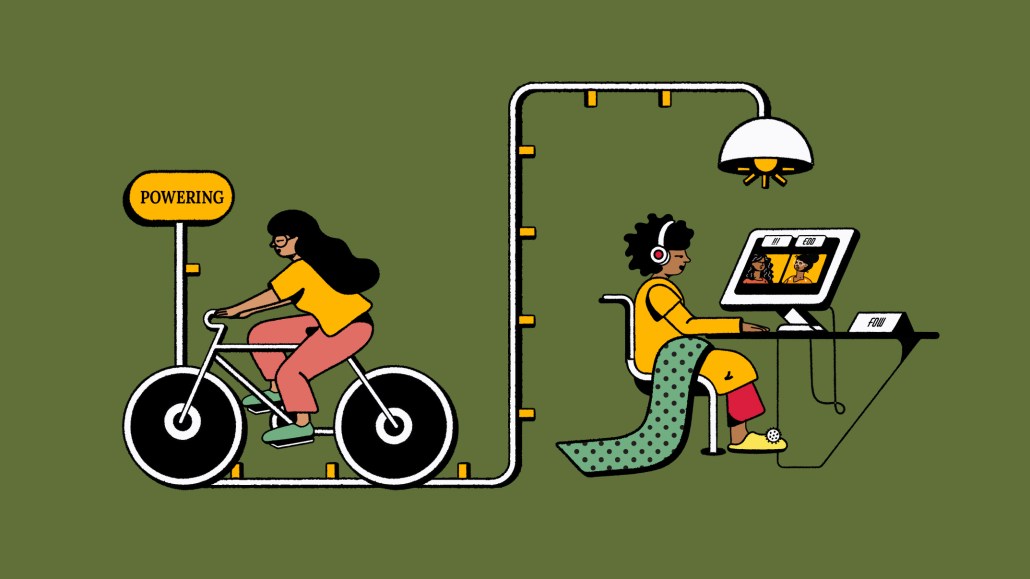Secure your place at the Digiday Media Buying Summit in Nashville, March 2-4
‘Sustainability makes good business sense’: Companies ramp up eco-friendly efforts for office returns

May is Earth Month. Coincidentally, many companies planning an imminent return to the physical office are ramping up their efforts to be more eco-conscious.
The commitment of businesses and brands to be more Earth-friendly is hardly new. After all, doing so just makes good business sense. Not only does it reduce waste — and boost the image of companies among their customers — but it also bolsters the bottom line.
Even still, during the pandemic, as firms dramatically curbed their energy and paper usage and reduced their office footprint, sustainability has become a whole new rallying cry.
The global agency holding company IPG launched an initiative in the runup to Earth Month that underscored its commitment to the environment. Through its Sustainability Allies team, it has set a benchmark to save 50,000kg of Co2 and one million liters of water over three weeks this month. It has encouraged employees to share their sustainability efforts on social media and is giving the first 100 employees to save 1kg of carbon an insulated tumbler made of recycled plastic.
“Our fragile ecosystems around the world are suffering and underrepresented and disenfranchised communities experience this even more,” the company stated in a recent company memo. “As we continue to face the COVID-19 pandemic, now more than ever, access to clean air and safe water is critical to the health of people around the world. IPG is committed to environmental, social and governance issues. Individual behavior changes, such as reducing waste, are actionable ways to reduce our own contributions to climate injustice.”
Agency R/GA had already prioritized improving its sustainability before the pandemic, but over the last year its global office footprint reduced further and in a way that better suits its future plans for the office, according to Jess Astor, vp, executive director of business operations, R/GA. “With fewer people expected to be commuting to the office daily, office layouts will prioritize space for collaboration and communal work areas, and we have built a desk- booking system,” she said.
R/GA is among the companies radically reimagining their commitment to the physical workspace — and the use of resources that comes with it — as detailed in a recent article by The New Yorker.
Meantime, the office space solutions giant Industrious announced a goal of reducing paper and plastic waste by 25% its 100-plus locations in the U.S., where it operates more than 3 million square feet of space.
Industrious chief commercial officer Anna Levine said the company created its sustainability program after hearing feedback from its members and its own team about how some simple shifts in operations could have a significant impact on reducing waste. Its members, the company discovered, typically spend between six and nine hours a day in the office and use an average of five paper or plastic cups daily per member.
“We’ve known for years that sustainability just makes good business sense. Buying reusable and bulk items, for example, allows us to save longer term on operating costs,” Levine said. “And people truly want to be part of the change they want to see — they recognize that with small behavioral shifts their collective action can yield real results. As we see a national and global shift back to the physical workplace this summer, we still believe that these small shifts can produce big change — it’s one of the fundamental benefits of coworking and it’s important to remain mindful of that.”
Remote and hybrid work arrangements have had a clear impact on sustainability efforts. As a result of the pandemic, 78% of U.S. consumers believe their daily habits will change over the long term, including how they work and live, according to a recently released survey of 8,041 consumers globally by the professional services company GHD.
GHD also found that even after offices open back up, 37% of respondents in the U.S. expect to work from home more than they did before the pandemic, while 30% said their employer’s green credentials impacted their decisions about whether to become an employee and would consider those factors when choosing a future employer.
“The shifting workplace dynamics will permanently change how we think about everything — from transportation and digital infrastructure to how we configure our cities and office spaces,” said Greg Carli, sustainability, resilience & Environmental Social Governance advisory leader at GHD.
As cofounder and chief innovation officer of Resonance Global — a company whose business is helping other companies embrace sustainability — Steve Schmida knows a thing or two about how companies can become more eco-conscious upon the return to the office. Among the actions he advises his clients to take are continuing to cut back on business travel, and on office space.
It’s advice Schmida himself has followed.
“As the pandemic wore on, Resonance reduced its office footprint — a trend that we will continue as we allow much greater flexibility for remote work even as we return to the office,” he said. “Less office space means lower cost and carbon emissions, as well as reduced use of resources.”
More in Marketing

Future of Marketing Briefing: AI’s branding problem is why marketers keep it off the label
The reputational downside is clearer than the branding upside, which makes discretion the safer strategy.

While holdcos build ‘death stars of content,’ indie creative agencies take alternative routes
Indie agencies and the holding company sector were once bound together. The Super Bowl and WPP’s latest remodeling plans show they’re heading in different directions.

How Boll & Branch leverages AI for operational and creative tasks
Boll & Branch first and foremost uses AI to manage workflows across teams.








